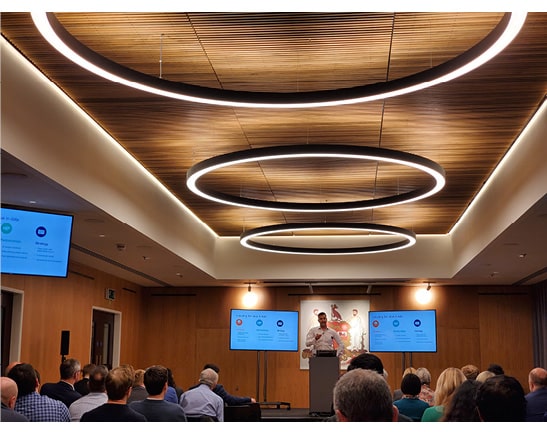Tech Summit 2022: What did we learn?
The inaugural Bristows Tech Summit took place on 24 November, with four thought-provoking talks from Bristows experts on the technology topics we see crossing our desks the most: adtech, AI and data, the metaverse and the market positions in technology deals.
12.12.2022

The Tech Summit, which was held in person at The Royal College of Surgeons, is available to watch on Bristows’ YouTube channel here.
Mark Watts introduced the event by outlining Bristows’ expansive view of what technology encompasses and therefore which businesses the Tech Summit is for: not just those creating tech products and services, but any business looking to use technology to disrupt their markets.
The future of adtech
The first talk, from Jamie Drucker and Sukanya Majumdar, was on the future of adtech. The speakers outlined the profound change that the adtech sector is going through due to regulatory pressure, technological developments and increasing consumer understanding of how data is shared. It included a demonstration of the transaction that goes on behind the scenes when a user goes on a website and sees an ad. This step-by-step breakdown of the complex process (which only takes 0.2 milliseconds in real time) used animation to clearly outline the different parties involved and the information being shared at each stage. Jamie and Sukanya then outlined some of the challenges of compliance, notably consent and special category data, and some recent regulatory action. They went on to look to the future and consider what might replace third-party cookies, suggesting an increased emphasis on the context of ads (i.e. where on the page the ad will be), and answered an audience member’s question on whether they see the current privacy mode settings changing.
Watch Jamie and Sukanya’s full talk on adtech and their response to the question on privacy mode below.
Interested in more adtech related articles? Click here.
Or listen to Bristows’ The Roadmap tech podcast episode on adtech here. Don’t forget to subscribe!
AI and the value in data
In the second talk, on AI and the value of data, Charlie Hawes began by emphasising the importance of regulating AI: if we are going to delegate important decision-making to machines, we need to be as sure as we can that the outcomes of those decisions are as unbiased and transparent as possible. Charlie went on to outline the current regulatory framework and how it is developing; illustrating the anticipated changes with an infographic that included laws and soft guidance, both sector specific and general. Finally, Charlie outlined key practical takeaways for companies building, buying or investing in machine learning products.
Vik Khurana then discussed the value in data, outlining some of the emerging models businesses are using to commercialise data through different case study examples. He emphasised the transformative power of data by covering how different organisations can use data effectively and innovatively.
Vik used three examples:
- Turning data into action – how a wind farm can collect data about the performance of its turbines, use it to train an AI to predict when the turbines will break, and keep producing clean energy for longer;
- Using data to build new products – how a medical device company can create a connected pacemaker, and use the data it collects about a patient’s heart health to create an app that allows them to manage their condition on the go; and
- Data to solve big challenges – how a company in a highly regulated sector with low access to data can create a data platform that all companies in that sector can use, each contributing their data and in return getting to see the ‘bigger picture’ that helps everyone comply with new regulations.
Watch Charlie and Vik’s full talk on AI and the value of data below.
Read our AI articles here, and articles on data here.
The metaverse
The third talk, from Mark Watts, Julia Cockroft and Jeremy Blum, was on the metaverse, a platform often discussed in theory but rarely seen in practice. Mindful of this, Mark Watts ran through a live demonstration, during which Dan Owen navigated the Meta Horizon Workrooms metaverse in front of the audience.
Mark addressed whether the metaverse is actually real and how much of a challenge it will pose. In doing so, he emphasised that there is no one “metaverse”, giving instead examples of virtual reality metaverses (such as in Fortnite) and augmented reality metaverses (such as Pokemon Go), before setting out some criteria for what counts as a metaverse. Mark then discussed the issue of privacy when everything is code, touching on complications relating to surveillance, jurisdiction and data retention – notably asking “can you whisper in the metaverse?”.
Julia Cockroft then considered taxation in the metaverse and clarified that even if it might elude our imagination, the metaverse definitely will not elude tax authorities. Julia emphasised the jurisdictional challenges faced by tax authorities, providing an overview of the legal framework currently being developed by the OECD. Julia then outlined an example chain of transactions, from cash to bitcoin to an NFT and back again, explaining which of the transactions could be taxable – spoiler alert: all of them.
Jeremy Blum then discussed trade marks in the metaverse. New opportunities for brand owners lead to new opportunities for infringers, and Jeremy outlined the various challenges that will probably arise and how they might be managed by regulators. Jeremy also emphasised the complexities of working out the relevant jurisdiction, now that factors outlined in case law such as physical presence or currency may no longer be applicable in a world of avatars and cryptocurrencies.
Watch Mark, Julia, and Jeremy’s full talk on the metaverse below.
Missed our metaverse articles series? Catch up on the topic here.
Overview of market positions in technology deals
In the final talk, Adrian Sim and Faye Harrison provided insight into the market positions on key clauses in technology contracts. Adrian and Faye acknowledged that while clients are happy to leave the intricacies of contract drafting to the lawyers, they are keen to understand the market position on crucial terms. By surveying recent technology contracts we have acted on, the speakers provided an analysis of the actual market position as witnessed by Bristows’ lawyers, outlining possible anomalous results and using their expert perspectives to comment on how they see the position developing and why. The talk covered supplier’s liability, supplier indemnities, data protection liability, confidentiality, customers’ general liability, customer indemnities and deemed direct losses.
Watch Adrian and Faye’s full talk on contractual positions and market trends in technology deals below.
Check out our technology sector page for more information on the work we do.

Tabitha Reed
Author
